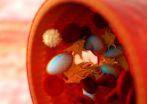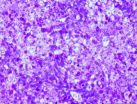New drug targets may lead to effective Ebola treatments
2014-11-13
(Press-News.org) There are no approved treatments or preventatives against Ebola virus disease, but investigators have now designed peptides that mimic the virus' N-trimer, a highly conserved region of a protein that's used to gain entry inside cells.
The team showed that the peptides can be used as targets to help researchers develop drugs that might block Ebola virus from entering into cells.
"In contrast to the most promising current approaches for Ebola treatment or prevention, which are species-specific, our 'universal' target will enable the selection of broad-spectrum inhibitors that should block all known--and likely future--Ebola strains," said Dr. Michael Kay, senior author of the Protein Science study.
INFORMATION:
ELSE PRESS RELEASES FROM THIS DATE:
2014-11-13
In a study of middle-aged men who were overweight, researchers found that if a man's parents were older at the time of his birth, he was more likely to have lower blood pressure, more favorable cholesterol levels, and improved glucose metabolism. It's unknown whether the beneficial effect was due to having an older mother, an older father, or both.
Additional studies are necessary to help shed light on the effects of parental age at childbirth on the metabolism of men and women. "In particular, more research is required to understand whether these effects are due to ...
2014-11-13
In a study that looked at what factors might affect whether or not a patient receives intensive medical procedures in the last 6 months of life, investigators found that older age, Alzheimer's disease, cancer, living in a nursing home, and having an advance directive were associated with a lower likelihood of undergoing an intensive procedure. In contrast, living in a region with higher hospital care intensity and black race each doubled a patient's likelihood of undergoing an intensive procedure.
"It's pretty striking the extent to which nonclinical factors--such as ...
2014-11-13
Preeclampsia, a late-pregnancy disorder that is characterized by high blood pressure and organ damage, may be caused by problems related to meeting the oxygen demands of the growing fetus, experts say in a new Anaesthesia paper.
Left untreated, preeclampsia can lead to serious--even fatal--complications for a pregnant woman and her baby. The new theory challenges the current view that pre-eclampsia is caused by a problem with the placenta. "When the fetus is not getting enough oxygen and nutrients for its growth--due to conditions in the mother, conditions in the placenta ...
2014-11-13
Investigators recently set out to consider whether homicides involving social networking sites were unique and worthy of labels such as 'Facebook Murder', and to explore the ways in which perpetrators had used such sites in the homicides they had committed.
The cases they identified were not collectively unique or unusual when compared with general trends and characteristics--certainly not to a degree that would necessitate the introduction of a new category of homicide or a broad label like 'Facebook Murder'.
"Victims knew their killers in most cases, and the crimes ...
2014-11-13
Stanching the free flow of blood from an injury remains a holy grail of clinical medicine. Controlling blood flow is a primary concern and first line of defense for patients and medical staff in many situations, from traumatic injury to illness to surgery. If control is not established within the first few minutes of a hemorrhage, further treatment and healing are impossible.
At UC Santa Barbara, researchers in the Department of Chemical Engineering and at Center for Bioengineering (CBE) have turned to the human body's own mechanisms for inspiration in dealing with the ...
2014-11-13
Researchers at the University of Texas Medical Branch at Galveston, in collaboration with The University of Texas Health Science Center at Houston (UTHealth), Baylor College of Medicine and the Georgia Regents University, report for the first time that the cholesterol-lowering drug simvastatin inhibits the growth of human uterine fibroid tumors. These new data are published online and scheduled to appear in the January print edition of the Journal of Biological Chemistry.
Statins, such as simvastatin, are commonly prescribed to lower high cholesterol levels. Statins ...
2014-11-13
A study from the Institute of Food Research has shown that Campylobacter's persistence in food processing sites and the kitchen is boosted by 'chicken juice.'
Organic matter exuding from chicken carcasses, "chicken juice", provides these bacteria with the perfect environment to persist in the food chain. This emphasises the importance of cleaning surfaces in food preparation, and may lead to more effective ways of cleaning that can reduce the incidence of Campylobacter.
The study was led by Helen Brown, a PhD student supervised by Dr Arnoud van Vliet at IFR, which is ...
2014-11-13
The strains of enterotoxigenic Escherichia coli (ETEC) that infect adults and children in Asia, Africa, and the Americas, have notably similar toxins and virulence factors, according to research published ahead of print in the Journal of Bacteriology. That bodes well for vaccine development, says corresponding author Åsa Sjöling, now of the Karolinska Institutet, Stockholm, Sweden. ETEC infects 400 million people annually, or 5.3 percent of the world's population, killing 400,000.
In the study, Sjöling et al. set out to determine whether the heat labile ...
2014-11-13
Frightening experiences do not quickly fade from memory. A team of researchers under the guidance of the University of Bonn Hospital has now been able to demonstrate in a study that the bonding hormone oxytocin inhibits the fear center in the brain and allows fear stimuli to subside more easily. This basic research could also usher in a new era in the treatment of anxiety disorders. The study has already appeared in advance online in the journal "Biological Psychiatry". The print edition will be available in a few weeks.
Significant fear becomes deeply entrenched in memory. ...
2014-11-13
The liver stores excess glucose, sugar, in the form of glycogen--chains of glucose--, which is later released to cover body energy requirements. Diabetic patients do not accumulate glucose well in the liver and this is one of the reasons why they suffer from hyperglycemia, that is to say, their blood sugar levels are too high. A study headed by Joan J. Guinovart at the Institute for Research in Biomedicine (IRB Barcelona) demonstrates that high hepatic glucose stores in mice prevents weigh gain. The researchers observed that in spite of having free access to an appetizing ...
LAST 30 PRESS RELEASES:
[Press-News.org] New drug targets may lead to effective Ebola treatments


